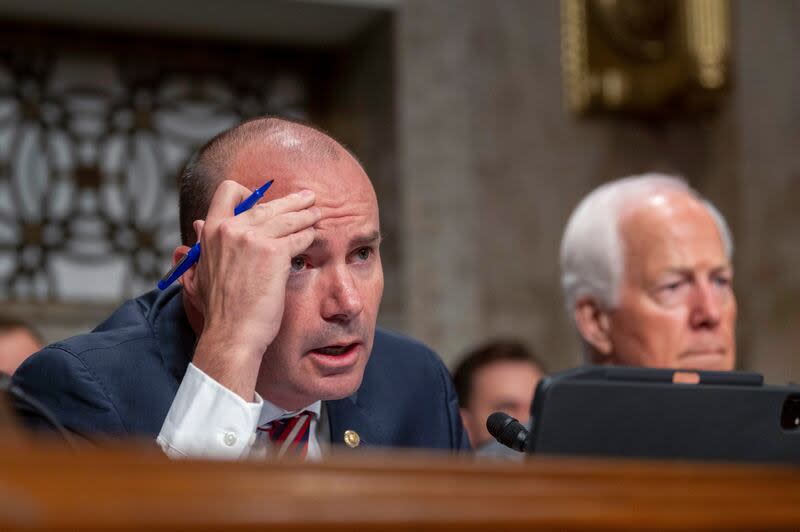The acting chief of the U.S. Secret Service told senators he was “ashamed” for his agency’s failure to secure the rooftop from which a 20-year-old gunman took aim at former President Donald Trump at a rally in Pennsylvania on July 13. But despite his admission of fault, Republican lawmakers, including Sen. Mike Lee, pressed him for more answers at the Senate Judiciary Committee hearing Tuesday.
“What I saw made me ashamed,” acting Secret Service Director Ronald Rowe said in his testimony. “As a career law enforcement officer, and a 25-year veteran with the Secret Service, I cannot defend why that roof was not better secured.”
In his testimony, Rowe detailed the action the federal agency has taken since the attack on Trump. But throughout the hearing, even as he explained the security failures at the rally, he failed to provide concrete answers about the Secret Service’s lapses when questioned by GOP senators who accused the agency of treating Trump differently than they would President Joe Biden.
Does Secret Service treat the sitting president differently than the former president?
Sen. Mike Lee, R-Utah, pressed Rowe over why Trump took the stage minutes “after multiple suspicious person reports were provided, complete with photos and information suggesting that the assailant had a range finder.”
Rowe said the Secret Service didn’t hear any communication about the individual being armed or having an intention to shoot. He said he would get back to Lee with the number of suspicious person reports the law enforcement agency received that day.
In his written testimony, Rowe said, “At 5:43 p.m., a local Butler County Emergency Services Unit counter sniper team member texted the Secret Service counter sniper team leader about a suspicious person and sent two photos of the individual, later identified to be the assailant.” The former president took the stage seven minutes later.
Lee continued, “Would President Biden ever be allowed on stage under similar circumstances with an unresolved set of multiple suspicious person reports provided, including indicating that there was a rangefinder involved?”
To this, Rowe said it would depend on the situation. “For us, it comes down to … a potential threat. Is the individual carrying an (improvised explosive device)? Is there a weapon?”
During his interaction with Sen. Ted Cruz, R-Texas, Rowe maintained that “Secret Service agents are not political.” The conversation got heated when Cruz accused the federal agency of diverting resources from the Trump campaign to first lady Jill Biden’s event. Rowe said Cruz’s assertion was false.
Meanwhile California Democratic Sen. Laphonza Butler praised Rowe for being “authoritative.”
She added, “He has proven that he had been out at the camps, at the site, and he is taking responsibility.”
Secret Service acting director fails to answer important questions
According to CNN, Cruz said Rowe appeared more “forthcoming” than Kimberly A. Cheatle, the former Secret Service director, who resigned after Republicans and Democrats called for her ouster after she testified in the U.S. House.
“That’s a step forward,” the Texas senator said. “But when asked specific questions, (Rowe) would not provide specific answers.”
Rowe sidestepped several of Lee’s questions, including one about the eight shell casings found next to the assailant’s body. “He was neutralized after the first shot, where did those other shots come from?” the Utah senator asked.
Rowe said the Secret Service is still carrying out a ballistic analysis. He also couldn’t answer why the sniper teams were assigned to the rooftop overlooking where the shots were fired.


Lee called on Rowe to provide details to Congress on the questions left unanswered as more information comes to light. He also asked Rowe to submit the list of requests Trump’s protective detail and campaign made to the Secret Service for additional resources.
The timeline of events leading up to the assassination attempt
The shooter fired three shots aimed at Trump at 6:11 p.m., around the same time when the sniper team checked in with local law enforcement about a tip of a suspicious person.
“No information regarding a weapon on the roof was ever passed to our personnel,” Rowe said at the hearing.
“Within three seconds, the former President’s detail rushed the stage and covered former President Trump, shielding him with their bodies,” Rowe said. Roughly 15 seconds later, the Secret Service neutralized the assailant. One of the first three shots pierced through Trump’s ear, Rowe said.
Upon Rowe’s direction, the Secret Service will now require three agents to ensure security plans are vetted, expand the use of drones to detect threats on roofs and other high structures and heighten the use of agents, uniformed officers and technical support personnel for events like the upcoming Democratic National Convention in November.
The Secret Service also began protecting vice presidential nominee Sen. JD Vance and his family, as well as presidential candidate Robert F. Kennedy, Jr., whose father and uncle were killed by assassins.
Rowe also indicated during the hearing that the agency will add 200 agents to its force before the 2028 Olympics in Los Angeles, marking the first time the agency increased its staffing in a “number of years.”
Rowe promised his agency would cooperate with all the investigations launched into the attack, including those opened by Congress, the FBI, the Homeland Security Department and the White House. The Secret Service’s Office of Professional Responsibility is conducting an internal review of whether any agents violated protocol.
